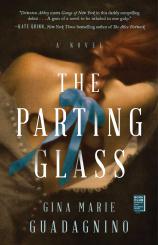The Parting Glass
Review
The Parting Glass
A girl and her brother left their verdant home in 1830s Donegal after their parents died, hoping to seek their fortunes in the cityscape of New York, which was just beginning to blossom. Both of them find quite a bit more than they bargained for.
When THE PARTING GLASS begins, Maire O'Farren has been passing as Mary Ballard for a couple of years. New York didn't favor the Irish, much less Irish Catholics, so their friends trained her to speak and behave as a Scottish Presbyterian. It works, and she's secured a position as the lady's maid to the young, esteemed Charlotte Walden. Her brother, Seanin, can't clean up his accent quite as much, and has taken on a position as the family's stable groom. Maire and Seanin are twins, and as close as can be. They looked out for each other back in Donegal, and aside from a few other lower class Irishmen in the city, they're all the other really has. But tensions have been brewing at Tammany Hall, and Seanin ends up entangled. Maire, however, doesn't notice until it's too late.
"Maire is so heartwrenchingly brave in her own way, and I love that we get to read her story. Guadagnino tells it beautifully."
You see, she is rather occupied with being helplessly, wholly, head-over-heels in love with Charlotte.
To add to that trouble, so is Seanin. And Charlotte has fallen for him right back. Maire knows she couldn't confess her feelings to her lady employer for reasons upon reasons, but helping Charlotte sneak around with Seanin is almost more than she can bear. She ends up finding comfort in the arms of an enterprising young courtesan named Liddie Lawrence.
Some of the twists and turns these two love triangles take may feel a bit well-trodden, but I've never read one quite like this before: queer and sensual and full of longing. THE PARTING GLASS stands out most notably for its writing. I could hear the Irish lift off the page in more ways than one, I could hear Maire sing when she does, and I could sense when she shifted in speaking her adopted accent to Charlotte and her true voice to Liddie. Gina Marie Guadagnino completely transported me. I could see the filthy streets and smell the perfume mingling with manure. I felt Maire's fear and longing.
Readers may seek to compare this work to Sarah Waters', but THE PARTING GLASS stands in a league of its own. Let it! Let lesbian historical fiction sprawl into an expansive genre; I can't wait. This doesn't feel like Waters, save for the fact that it's about queer girls in the 1800s. That's not to say fans of Waters won't love this novel, as well they may (yes, I'm a fan of hers too), but to emphasize that we don't need to compare all lesbian historical fiction to each other, and that this feels quite different in many ways --- to its merit! It feels like an Irish immigrant in love with her employer, like tension and release, like secrets tucked into corners of pubs and within the folds of skirts. The language lilts, the story seduces, and the narrative is accessible and immersive at once.
Maire is so heartwrenchingly brave in her own way, and I love that we get to read her story. Guadagnino tells it beautifully.
Reviewed by Maya Gittelman on March 22, 2019
The Parting Glass
- Publication Date: April 7, 2020
- Genres: Fiction, Historical Fiction
- Paperback: 336 pages
- Publisher: Washington Square Press
- ISBN-10: 1501198424
- ISBN-13: 9781501198427




